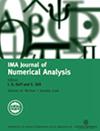A convergent stochastic scalar auxiliary variable method
IF 2.4
2区 数学
Q1 MATHEMATICS, APPLIED
引用次数: 0
Abstract
We discuss an extension of the scalar auxiliary variable approach, which was originally introduced by Shen et al. (2018, The scalar auxiliary variable (SAV) approach for gradient flows. J. Comput. Phys., 353, 407–416) for the discretization of deterministic gradient flows. By introducing an additional scalar auxiliary variable this approach allows to derive a linear scheme while still maintaining unconditional stability. Our extension augments the approximation of the evolution of this scalar auxiliary variable with higher order terms, which enables its application to stochastic partial differential equations. Using the stochastic Allen–Cahn equation as a prototype for nonlinear stochastic partial differential equations with multiplicative noise we propose an unconditionally energy stable, linear, fully discrete finite element scheme based on our augmented scalar auxiliary variable method. Recovering a discrete version of the energy estimate and establishing Nikolskii estimates with respect to time we are able to prove convergence of discrete solutions towards pathwise unique martingale solutions by applying Jakubowski’s generalization of Skorokhod’s theorem. A generalization of the Gyöngy–Krylov characterization of convergence in probability to quasi-Polish spaces finally provides convergence of fully discrete solutions towards strong solutions of the stochastic Allen–Cahn equation. Finally, we present numerical simulations underlining the practicality of the scheme and the importance of the introduced augmentation terms.收敛的随机标量辅助变量法
我们讨论了标量辅助变量方法的扩展,该方法最初由 Shen 等人(2018,The scalar auxiliary variable (SAV) approach for gradient flows.J. Comput.Phys.,353,407-416)提出的用于确定性梯度流离散化的方法。通过引入一个额外的标量辅助变量,这种方法可以推导出一种线性方案,同时仍然保持无条件稳定性。我们的扩展用高阶项来增加标量辅助变量演化的近似值,从而将其应用于随机偏微分方程。我们将随机 Allen-Cahn 方程作为具有乘法噪声的非线性随机偏微分方程的原型,基于我们的增强标量辅助变量方法,提出了一种无条件能量稳定、线性、完全离散的有限元方案。通过应用 Jakubowski 对 Skorokhod 定理的概括,我们恢复了能量估计的离散版本,并建立了与时间相关的 Nikolskii 估计,从而证明了离散解向路径上唯一的马丁格尔解的收敛性。Gyöngy-Krylov 对准波兰空间概率收敛特性的概括最终提供了完全离散解对随机 Allen-Cahn 方程强解的收敛性。最后,我们介绍了数值模拟,强调了该方案的实用性和引入的增强项的重要性。
本文章由计算机程序翻译,如有差异,请以英文原文为准。
求助全文
约1分钟内获得全文
求助全文
来源期刊
CiteScore
5.30
自引率
4.80%
发文量
79
审稿时长
6-12 weeks
期刊介绍:
The IMA Journal of Numerical Analysis (IMAJNA) publishes original contributions to all fields of numerical analysis; articles will be accepted which treat the theory, development or use of practical algorithms and interactions between these aspects. Occasional survey articles are also published.

 求助内容:
求助内容: 应助结果提醒方式:
应助结果提醒方式:


